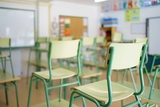Children's Intensive Emotional and Behavioral Services

If your child's behavioral, emotional and social needs significantly impact their ability to learn and participate fully in their home, school or community, our services at Children's Hospital of Philadelphia (CHOP) can help.
Children's Intensive Emotional and Behavioral Services (CIEBS) provides comprehensive psychiatric partial hospitalization services in a trauma-informed therapeutic setting that resembles a typical school classroom. The program is designed for children ages 5 to 13 in the Atlantic, Cape May, Cumberland and Ocean counties of New Jersey.
Children are referred to us by schools, pediatricians, the mental health community, child protective services and parents.
Our programs are designed to meet the varying needs of each child and family. Family therapy will be part of your child's treatment plan.
How we serve you
CIEBS offers two separate but integrated psychiatric programs to care for children who need varying levels of treatment. After our thorough evaluation, and depending on your child’s needs and age, they may be able to attend either program or both in succession for two to six months.
Conditions we treat
Children may have a history of being rejected, expelled or excluded from schools and community programs because their behavioral challenges make it difficult for them to participate.
Children who attend CIEBS may also have a history of:
- Developmental delays
-
Prenatal exposure to drugs or alcohol -
Neglect, abuse, and trauma

Meet your team
Our team includes psychiatrists, physicians, mental health therapists, nurses and other behavioral health professionals who work together to carry out your child's individualized treatment plan.

Our location
We care for patients at the Specialty Care Center in Atlantic County, NJ.

What to expect from CIEBS
CIEBS uses a classroom-like setting to teach your child how to better manage their emotions and behaviors with a variety of individual, group and creative therapies.